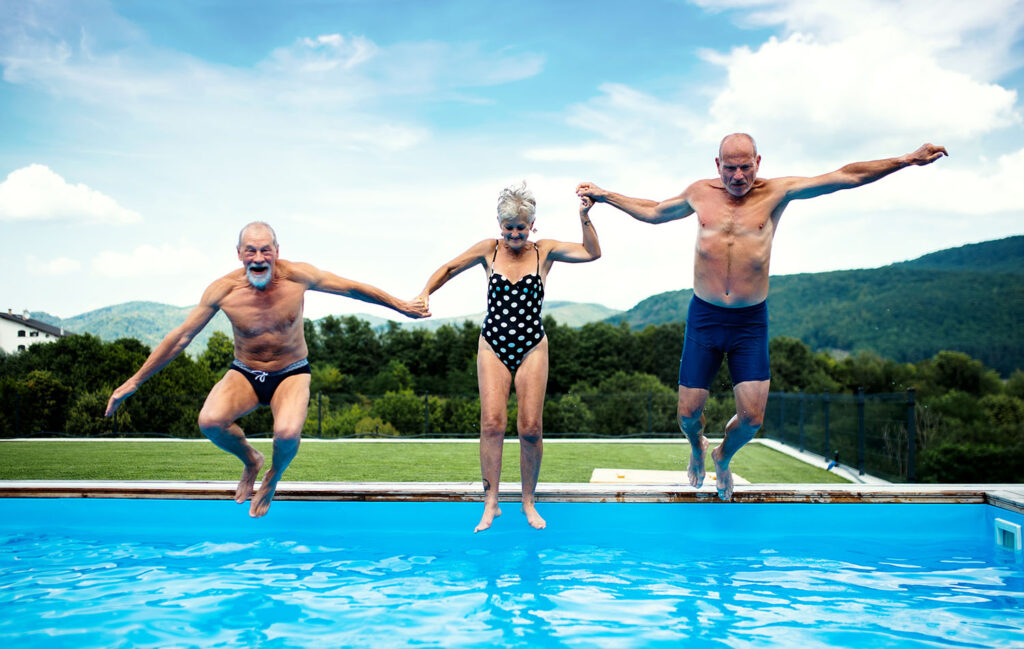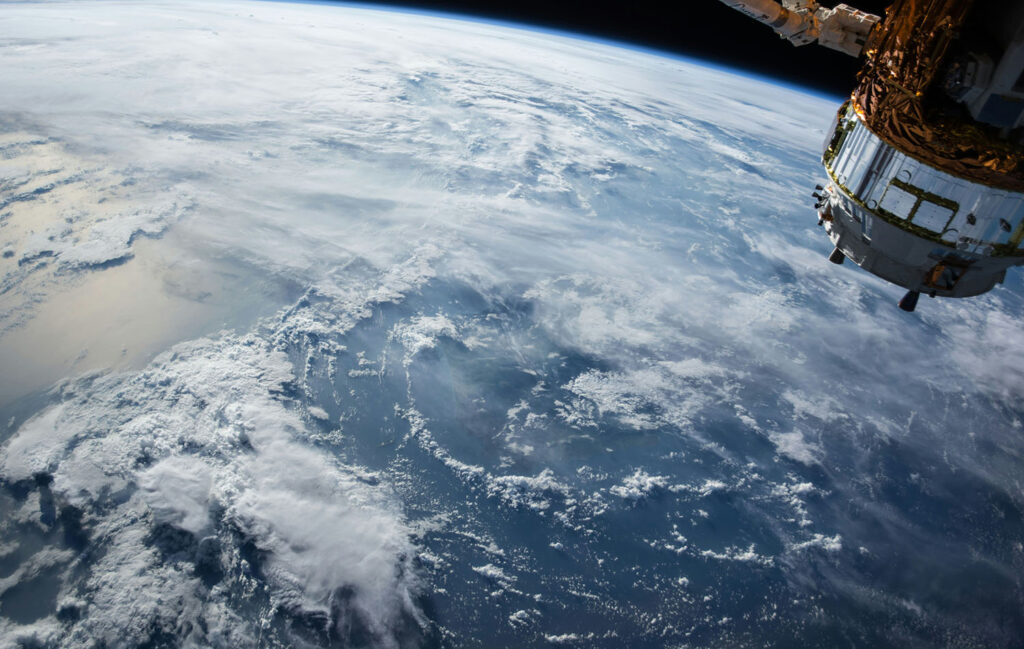
By Alliance Communications Coordinator Amy Durr
I’m lowering my expectations, hoping to shiver while eating cold foods, desultorily weeding my garden whenever the temperature is less than 87, and still feeling the impending doom of the school year (from which I have been liberated).
I also say “It’s so hot” millions of times to everyone I come into contact with. But, truly, August is a gift. An awkward gift, but a gift nontheless.
It’s Hard to Be Super Productive When the Heat Index Goes Above 100. Good.
Lucky for us August is hot, which tends to quiet things down. People vacation, or stay inside in the air conditioning. Some companies have half-day Fridays. The heat becomes a natural invitation to reconnect with our more instinctive, embodied, and joyful selves.
In contrast to the productivity-obsessed culture that governs much of the year, summer offers a chance to rewild – to let go of artificial constraints and remember our connection to nature, play, movement, rest and wonder.
Rewilding Yourself is a Lot Like Being Seven Again
I recently read a lovely book which discusses how we can help rewild urban areas called A Natural History of Empty Lots by Christopher Brown. Brown says:
“The greatest hope in the short-term lies in grassroots rewilding — individual, household, neighborhood, and community action to achieve the rebalance our systems of law and government cannot.
This kind of change happens on a local, and sometimes hyperlocal, scale: guerrilla gardening and urban foraging, green roof building and pocket prairie planting, conservation easements and industrial infrastructure allowed to go wild.”
It turns out that rewilding ourselves is similar – I like to think of it as going feral in the best ways. For example, psychological rewilding means reconnecting with our innate, natural tendencies and behaviors, often by being in nature more and paying attention to how things grow, shift, and flow.
Summer is a season where reconnecting with our wilder selves is more accessible and socially acceptable, so let’s take advantage of that by:
- Laying under a tree, listening to the creaks and whispers
- Watching a bird feeder (birds are strange – I love their weirdness)
- Smelling everything in our gardens (tomato plants have a bewitching fragrance)
- Tasting the sweetness of fruits and vegetables (rolling the seeds along your tongue)
I love to lay under the towering hardy hibiscus bush in my yard – it smells lovely, the insects buzz and it’s as close as you can get to an approved adult fort. My neighbors who share the yard were worried about me the first time they saw me and came running out to make sure I didn’t need them to call 911. Funny but also sad – can’t we normalize laying under shrubs?
You Can Out-Play the Kids in Your Life If You Really Try
Summertime play for adults can be running, yelling, throwing, splashing, hopping, bouncing and dancing – a reclaiming of childlike joy and curiosity.
But it can also be more subtle – a loosening of cultural norms while getting back in tune with our natural rhythms and values. In Enchantment: Awakening Wonder in an Anxious Age, Katherine May talks about giving herself permission to play:
“The skills of deep play took far longer to learn than anything I’d studied before. They meant asserting the awkward right to time, space, and solitude; making a shameful claim on my own creativity…They meant putting aside time to do things that seemed pointless to the outside world.
…It was long and slow and uncertain, and often quite boring. I did not feel very much like the boy who drew cats, gravitating irresistibly towards my craft. I felt like someone fighting their way through undergrowth to reach a place they only vaguely remembered. That place was the core of me. Every moment was worth it.”
Play time for kids of all ages – crazy costumes and cardboard floating-sinking boats. The Bideford Cardboard Boat Regatta hosts over 30 teams to showcase their creativity, engineering skills, and, most importantly, their ability to stay afloat using nothing but cardboard, paint and a bit of Viking spirit. Credit: Smurfit Westrock
Sometimes it’s difficult to think of what may be “play.” Play is voluntary, pleasurable, offers a sense of engagement, and takes you out of time. Embrace your unstructured time and get mental health benefits by playing! These are a few that came to me – what would you add?
- Set up an obstacle course with offbeat parts or try silly yoga
- Time yourself balancing on a ball chair, making it more difficult each round
- Make giant bubbles – the neighborhood kids will love you – and run through them
- Create a funny costume and find a place to wear it or throw a party; come up with personal theme days; or decorate your car for a holiday only you know about
- Sing karaoke style, with the most outrageous moves you can think of
I’ve run races in crazy costumes. Put wiggle eyes everywhere – on the stapler, a favorite toy and food in the fridge. Joined my kids for countless up-and-down Merry-Go-Round rides. When my kids were younger I’d always hide their one big holiday gift and make them follow clues to find it.
Wonder Is a Liberation Practice, According to the Internet
Summer is a great time to fill yourself with awe, whether you’re camping, gazing at the vast sea, visiting National Parks, exploring a new place or simply watching the bugs in your garden.
Poet Maggie Smith’s book Dear Writer described a simple flower that has me still wondering weeks later:
“Recently a friend of mine brought something remarkable to my attention: Violets create a second set of flowers that remain underground for the life of the plant. These flowers are cleistogamous — fully closed, self-pollinating. They don’t contain chlorophyll or engage in photosynthesis, but they mature and set seed.
What does this have to do with writing [or life]? Growth isn’t always visible. Sometimes the most essential work we do goes unnoticed, in dark and quiet places. And sometimes the failures clear a path for something better.”
If the violets are hiding blooms underground, what else is going on? Fireflies are glowing in the dark. Wild animals make eye contact with us. Jane Goodall believes that chimpanzees feel awe.

Every astronaut who has ever been in space has felt the overview effect, an overwhelming sense of wonder that’s transformative:
“Three astronauts were aboard that flight: Frank Borman, Jim Lovell, and Bill Anders. As Anders most famously put it, ‘We came all this way to explore the moon, and the most important thing is that we discovered the Earth.’ But it was Borman, the mission commander, who perhaps best described the overview effect, describing an internal feeling that most of us have never experienced for ourselves:
‘When you’re finally up at the moon looking back on earth, all those differences and nationalistic traits are pretty well going to blend, and you’re going to get a concept that maybe this really is one world and why the hell can’t we learn to live together like decent people.’”
My most awe-filled experiences can still bring me to tears: meeting each of my children for the first time, seeing a double rainbow, being aboard a ship in the middle of the vast ocean, watching a volcano erupt from a helicopter, flying over the silent desert in an airplane, or swimming in natural hot springs in Iceland.
Transcendent States Encourage our Imperfect Humanity
Do you feel a little wilder, more unhinged, less constrained even just considering rewilding yourself? Have you already found a worm under a rock, or laughed so hard you couldn’t breathe, or felt goose bumps for the first time in years?
Dacher Keltner presents a compelling case for rewilding, playing and seeking wonder in his book Awe: The New Science of Everyday Wonder and How It Can Transform Your Life. He says:
“Fun, like awe, is one of several self-transcendent states, a space of emotions that transport us out of our self-focused, threat-oriented, and status quo mindset to a realm where we connect to something larger than the self.
Joy, the feeling of being free, for the moment, of worldly concerns, is part of this space, as is ecstasy (or bliss), when we sense ourself to dissolve completely (in awe we remain aware, although faintly, of our selves). And fun, the mirth and lighthearted delight we feel when imagining alternative perspectives upon our mundane lives we so often take too seriously.”
Would you like to be a joy bringer? “Pure joy is a profound emotion that goes beyond mere fun. It is a state where sadness, tears, and happiness find a harmonious balance,” shares Gurdeep Pandher of the Yukon, an educator, Bhangra dancer, joy bringer and internet sensation.
I think when we come right down to it, August just isn’t as serious as the other months, and the escape hatch it gives allows us to find our wildness, and revel in it. Rewilding is restorative, not just for ecosystems but for us as humans, remembering ourselves as integral to nature.
Focusing on rewilding myself makes me forget to say, “It’s so hot.” But much, much more than that, it reminds me to follow nature’s rhythms, smell, taste, listen, watch and hear everything, and to seek wonder, joy and silliness.
Let me know how you’re rewilding.
Books you might love to read this August:
A Natural History of Empty Lots: Field Notes from Urban Edgelands, Back Alleys, and Other Wild Places, by Christopher Brown
Awe: The New Science of Everyday Wonder and How It Can Transform Your Life, by Dacher Keltner
Enchantment: Awakening Wonder in an Anxious Age, by Katherine May
Dear Writer: Pep Talks & Practical Advice for the Creative Life, by Maggie Smith
